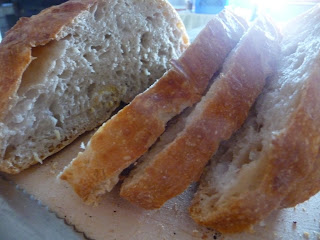

 I have a petty complaint to share. Pastors and future pastors take note.
I have a petty complaint to share. Pastors and future pastors take note.Nothing bothers me more than awful communion bread. Let's be honest--when we're talking about Christ's body, I do not imagine perfectly cut, crustless cubes that taste pasty and bland. How do you expect that to transubstantiate? Christ's body has heft, heartiness, and rough edges. It has a good crust, but is soft and chewy on the inside.
I have found such a bread. I have made such a bread.
To you foodies out there, you've read this all before. This is the NY Times bread, which exploded on the internet a long time ago. I, however, did not have the proper pot for it. Now that I say it, I still don't have the proper pot, but it will be a long time before I can afford a Le Creseut. I found this beauty (pictured) at the Philly AIDS Thrift for $9 and because it is heavy construction and lid, does the job.
So how do you make this miraculous (pun intended) bread?
I'll tell you one thing--there's no kneading involved. So all you faint-of-heart who shy away from breadmaking for fear you will become fatigued (or grotesquely muscular), do not fear. Simply mix the ingredients, and let rise for 18 hours. Fold it over itself twice and let it rise for two more. Pop it in the oven for half an hour or so. Breadmaking sans bread machine does not get easier or more delicious.
I'm going to pass along Smitten Kitchen's version of the recipe, because it is artfully written and takes great care to explain the difference in yeasts to novice cooks like myself.
In exchange, I'll offer you one of my favorite poems (introduced to me by a dear friend), perhaps of all time.
Sacrament II
Kathy Galloway
I have sat here many times
watching the breaking of the bread
and the raising of the cup,
and felt many things.
Anger at exclusion,
shame at division,
incomprehension at abstraction,
sadness at separation,
frustration at a beautiful simplicity
tangled into twists of dogma.
But this is a gift.
It is a sacramental moment.
This is, after all,
the sacrament of brokenness.
Bread is not broken to be stuck back together.
Life is not broken to be stuck back together.
Wine is not poured out to be put back in the bottle.
Life is not poured out to be put back in the bottle.
We incorporate brokenness into ourselves
and are made whole.
This absence is an appropriate remembering.
I am nourished by my empty-handedness,
refreshed by my dry throat.
These, more than the other, will ensure
that I will sit at dinner with my children,
in a cafe with a friend,
in a bar with strangers
and it will all be remembering
and it will all be sacrament.
May it be so.

1 comment:
"How do you expect that to transubstantiate?"
i don't :-)
that's why i'm protestant.
but i agree with you! crappy bread with a bad paring of white just ruins the moment. now take an herbed focciatta and a pinot noir and you have yourself a holy sacrament!
Post a Comment